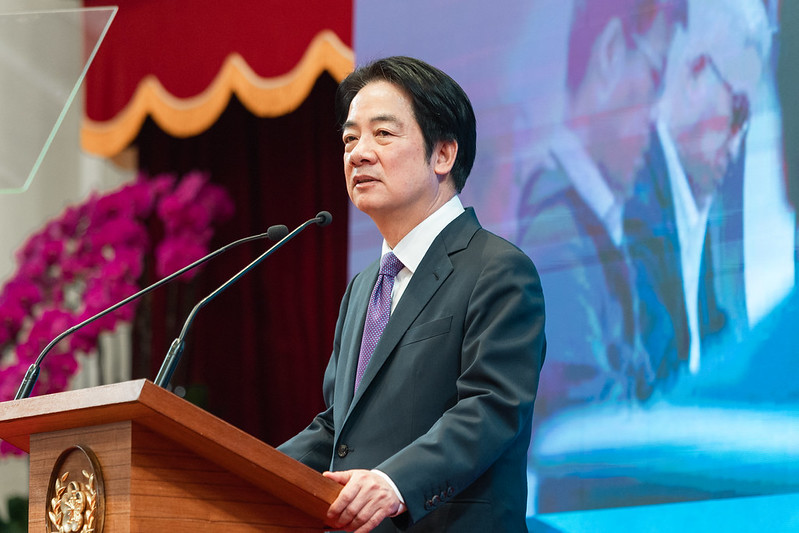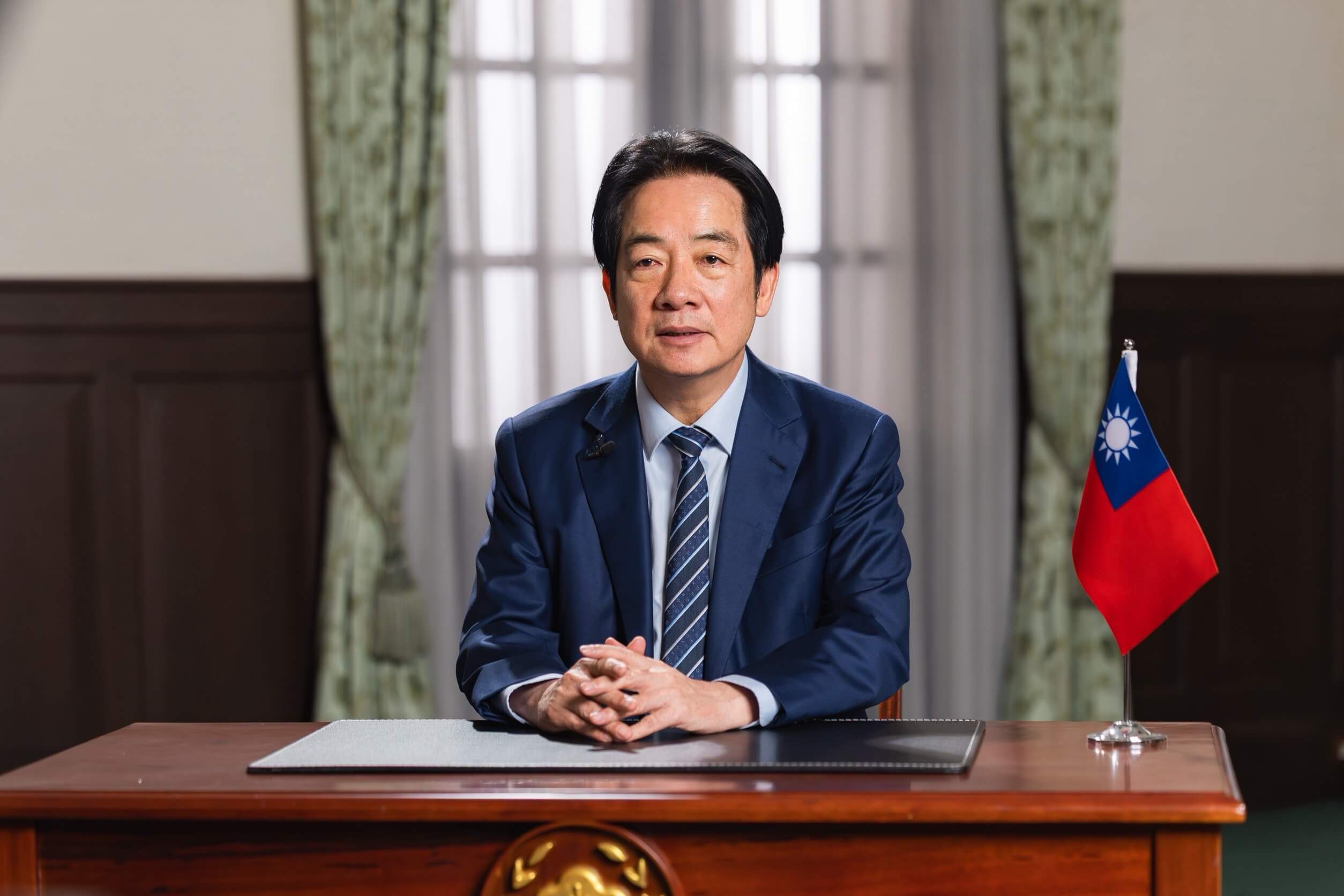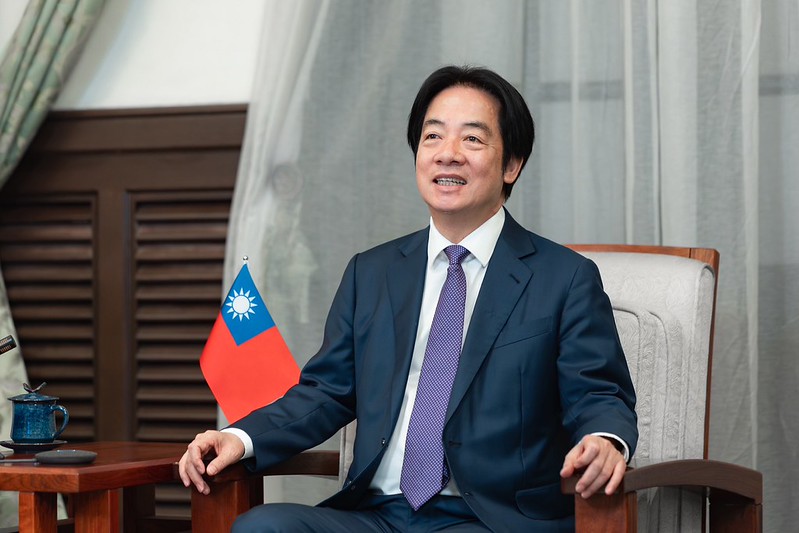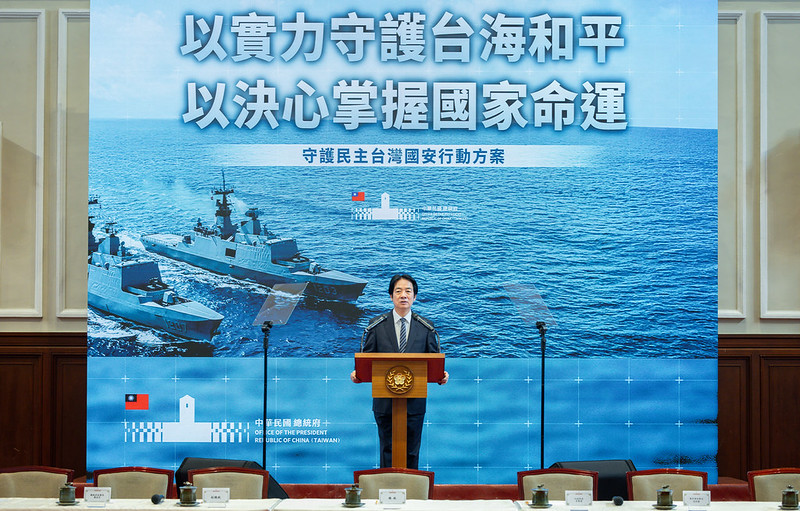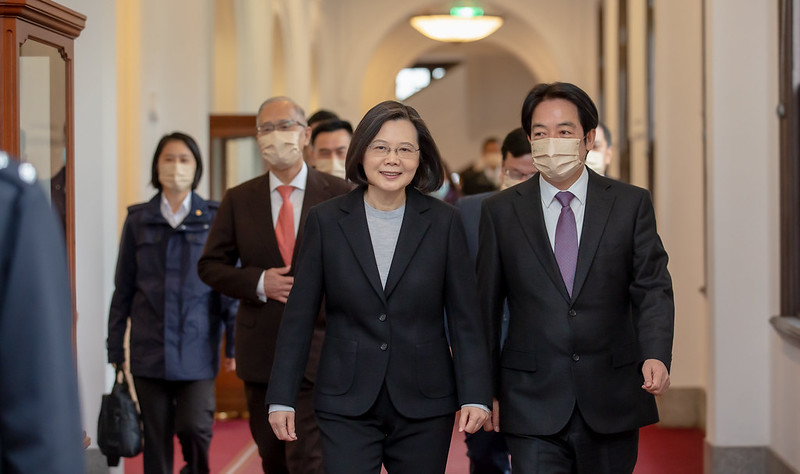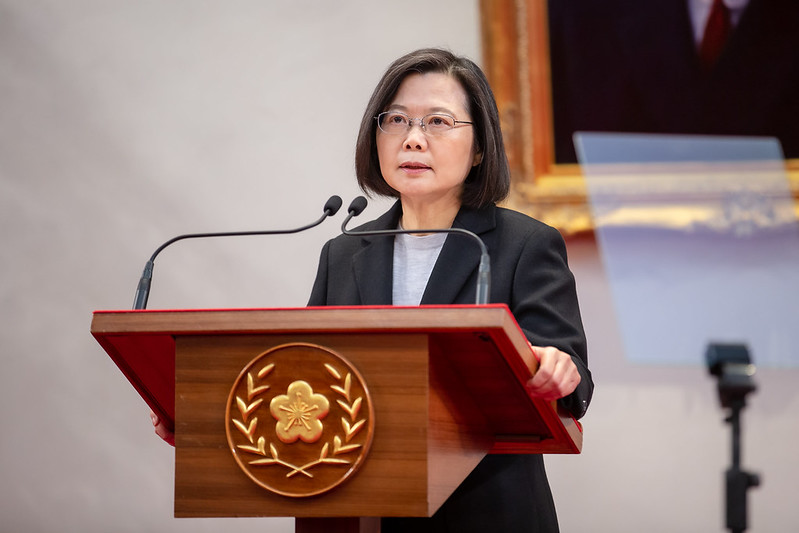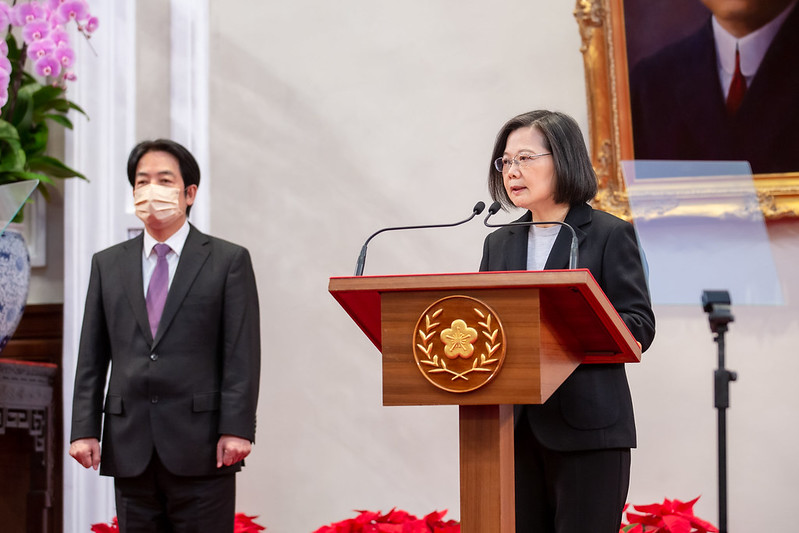News & activities
 News releases
News releases
After attending the New Year's Day flag-raising ceremony, President Tsai Ing-wen delivered her 2022 New Year's Address on the morning of January 1 in the Reception Hall of the Presidential Office. The president announced the four pillars of this year's plan for stable governance: continuing our global engagement, maintaining our economic momentum, strengthening our social security network, and safeguarding our nation's sovereignty. President Tsai also expressed confidence that by working together, the Taiwanese people will be able to overcome any challenges that 2022 may bring and take a big step toward a brighter future, exemplifying the theme of this New Year's celebration, "Resilient Taiwan, One with the World."
A translation of President Tsai's remarks follows:
Vice President Lai [Ching-te]; Secretary-General and Deputy Secretary-General [to the President, David T. Lee (李大維) and Lee Chun-yi (李俊俋)]; friends from the media and all those watching on TV and online; my fellow citizens; and Taiwan's friends around the world:
Good morning.
I want to begin by wishing you all a Happy New Year.
For Taiwan, this past year was unique. Together, we weathered several months made particularly turbulent by the pandemic. And together, we also engaged in a public discussion of four referendum questions, a process that started with proposals and ended in a vote.
This process reflects Taiwan's steady development of a more mature civil society. When challenges arise, we may have different opinions and ideas about what to do and how to respond, but resolving these issues through democratic mechanisms lets our society quickly regain calm and return to normal.
The pandemic put our national unity and the character of our citizens to the test. So I want to thank all my fellow Taiwanese for your hard work and dedication over the past year. When we come together and have faith in our democratic institutions, Taiwan can overcome any challenge.
There was also much good news for Taiwan last year. Our economic growth in 2021 is projected to hit an 11-year high. And our stock market index surged by more than 23 percent over the course of the year, recently reaching a new all-time high.
Last year, Taiwan's GDP per capita surpassed US$30,000 for the first time. In terms of purchasing power parity, our GDP per capita is already higher than many OECD countries. Not only that, the IMF forecasts that Taiwan will next year regain its spot among the world's 20 largest economies.
But many challenges still lie ahead. The pandemic continues to pose a serious challenge for countries around the world and fuel uncertainty around the global economic recovery. Inflation, property prices, and the possibility of another COVID-19 outbreak are all issues we must seriously address during this period of economic growth.
On top of this, we are faced with the challenge of how to maintain steady political and economic progress amid the fierce competition that the election scheduled for the second half of this year will bring. With constantly increasing military and diplomatic pressure from China, how to uphold our freedom, democracy, and consensus to connect with the world is also a challenge that Taiwan will have to face in 2022.
Continuing our global engagement, maintaining our economic momentum, strengthening our social security network, and safeguarding our nation's sovereignty are the four pillars of our plan for stable governance in 2022.
The results of last year's four referenda showed that the Taiwanese people are even more resolved to connect with the world. This year, we will step up our efforts to diversify our international trade and economic engagement, and reduce our reliance on any single market.
While we continue to promote our New Southbound Policy and deepen our cooperation with our partners under this program, we also hope to make further progress in our talks under the Taiwan-US Trade and Investment Framework Agreement so that we can lay a solid foundation for a potential free trade agreement between our countries.
In addition, we will do our utmost to gain the support of the members of the Comprehensive and Progressive Agreement for Trans-Pacific Partnership (CPTPP) for Taiwan's inclusion in the trade bloc. We will also soon put forward a plan to strengthen our ties with Europe, and promote deeper exchanges between Taiwan and European countries.
To maintain our economic momentum amid the changing global landscape of the past few years, private enterprises have shown great resilience, and have worked with our government to vigorously promote our 5+2 innovative industries plan as well as our development of Six Core Strategic Industries, boosting the overall competitiveness of Taiwan's industrial sector and helping it become a key driver of global economic development.
Taiwan is the global leader in semiconductor production. Going forward, Taiwan will play a pivotal role in responding to demand for chips in areas such as solutions for smart cities, the deployment of green energy technology, and the production of electric vehicles.
Taiwan is an indispensable part of the world's digital transformation and response to climate change. And the directions that Taiwanese firms take will shape the movement of global supply chains.
We must constantly strengthen the influence and competitiveness of Taiwan's industrial sector. That is why, in this new year, we will continue to promote our nation's energy transition, and why we will take a forward-looking and practical approach in drawing up a roadmap toward net-zero emissions, in order to guide the overall structural transformation of Taiwan's economy.
The Executive Yuan has also announced that our three programs to boost investment in Taiwan are being extended by another three years. We expect that this extension will help drive a further NT$900 billion in investment and create 40,000 job opportunities.
As we work to maintain economic momentum, we must also effectively address inflation and rising property prices, so that the fruits of economic growth can be used to drive real wage growth and raise living standards.
Rising commodity and property prices will be a common challenge for countries around the world this year. Since the second half of 2021, we have activated price stabilization mechanisms at public utilities and enterprises, and have employed discretionary financial controls, tax reform, and administrative review measures under our plan to promote a healthier real estate market, steps which have together kept domestic commodity and real estate price increases moderate in comparison with other countries.
Going forward, we will continue to use all policy tools at our disposal to ensure that prices remain stable. And, with the help of our Executive Yuan's price stabilization and real estate task forces, we will crack down on illegal market manipulation and hoarding practices.
Starting today, the monthly minimum wage has been raised to NT$25,250, a 5.21-percent increase over last year. And, once the central government's annual budget is passed, the salaries of our military personnel, civil servants, and public school educators will be increased by 4 percent. We hope these measures will help spur private-sector wage growth, which will in turn help curb the effects of inflation.
In our social housing plan, we will provide reasonably priced accommodation to young people and the disadvantaged. In 2021, we announced the start of the largest social housing construction initiative in Taiwan's history, as part of which we are awarding contracts in 50 projects to build 15,000 new homes. Combined, there are already 50,000 units for which contracts have been awarded, which are currently under construction, or which have already been built.
Looking to 2022, aside from accelerating our social housing construction initiative, we are also implementing programs to convert hotels into social housing and to help seniors move to units that better meet their needs, and we will continue to promote our subletting management scheme, which had already been expanded to 16,000 households as of the end of last year.
In addition, this coming year, we will keep in place the rent subsidy program we expanded in 2020, under which eligible young people and families can receive several thousand NT dollars per month depending on their city or county of residence.
Expanding social welfare and reducing the burdens involved in caring for our children and elderly is not only a matter of equity, but also a matter of social security, which is why we will continue to strengthen Taiwan's social security network.
As of last year, the network being built under our Long-Term Care 2.0 Plan spanned over 10,000 service facilities spread across the country. This year's budget for long-term care programs totals NT$60.7 billion, which we will use to build more long-term care facilities and provide additional services.
To reinforce our social safety net, we will continue to increase the number of public-sector social workers and professionals. This year, we will add over 5,000 such personnel, and will subsidize another 1,454 social workers in the private sector, so that we can reduce the burden on social workers and enhance our ability to protect disadvantaged families.
Following last year's increase, the childcare allowance will once again be raised to NT$5,000 this coming August. And we are set to reach our goal of adding 3,000 new public preschool classes by next year ahead of schedule.
The total number of public preschools, non-profit preschools, and private preschools that qualify for public subsidies grew considerably last year. In the past, parents expressed concern that they had only a 30-percent chance of drawing a place in a public preschool for their child. Now, their children have a 60-percent chance of entering a reasonably priced, high-quality preschool.
Last Mother's Day, I said that the government should be a trusted ally to kids and parents. This year, the minimum leave given to women for pregnancy checkups will be increased to seven days, and their spouses will also be given leave to accompany them during those checkups.
We will continue to review and increase these subsidies, while strengthening measures across the board to lighten the load of raising kids. We will deliver on our commitment that the government will do more to help you raise your children from birth through the age of six.
In this new year, stable governance is our most important priority. We will uphold our sovereignty and values of freedom and democracy, defend our territorial sovereignty and national security, and work to ensure peace and stability in the Indo-Pacific region.
We will also continue to monitor the situation in Hong Kong. Interference in the recent elections for the members of its Legislative Council's upcoming term has prompted further concerns about Hong Kong's democratic development. And just a few days ago, the Hong Kong government arrested several members of the media, adding to worries about the state of human rights and freedom of speech there.
The pursuit of democracy and freedom is not a crime, and Taiwan's position in support of Hong Kong will not change. Aside from showing our concern, we will cherish our own hard-earned freedom and democracy even more deeply. We will make Taiwan even better. We will show the world that democratic Taiwan has the courage to step out from the shadow of authoritarian China, and that we will not bow to pressure.
Lastly, I want to talk about cross-strait relations.
With the new economic climate we are facing during this pandemic, each side of the strait has its own challenges as well as its own responsibilities for people's welfare. At the same time, both sides together shoulder the responsibility to uphold peace and stability in the region.
Over these past few years, we have repeatedly called on the other side of the strait not to deprive Hong Kong of democracy and human rights, and we strongly protest its military incursions and diplomatic pressure directed at our side. These actions by the other side are of no benefit to the preservation of regional peace and stability.
Taiwan's consistent position has been that we will neither bow to pressure nor act rashly when we have support. We want to remind the Beijing authorities that they should not misjudge the situation, and that they should stop the spread of military adventurism within their ranks.
The use of military means is absolutely not an option for resolving the differences between our two sides. Only by upholding peace and stability in the Taiwan Strait, with each side working to take care of people's livelihoods and set their minds at ease, can there be the proper space and atmosphere for our two sides to peacefully and collectively address and seek solutions to the problems we face. This will also help reduce regional tensions.
"Resilient Taiwan, One with the World" is the theme of this New Year's celebration, and I know that, with your resilience, Taiwan can live up to this ideal. Thank you to all the Taiwanese people for your sacrifices and hard work over the past year. This coming year, we will once again overcome the challenges in our way, and take a big step toward an even brighter future. Thank you, and I wish you all a happy 2022!
